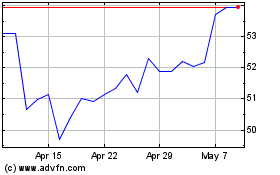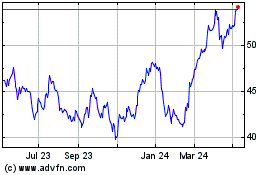EARNINGS PREVIEW: UK Bks Count On Wholesale Banking Revival
April 29 2009 - 5:35AM
Dow Jones News
TAKING THE PULSE: U.K. banks' interim management statements will
show that the reputations of their wholesale banking operations
have been redeemed in the first quarter of 2009.
Seen as the culprit behind write-downs that slashed profits at
nearly every major bank over the past 18 months, wholesale banking
is back with a vengeance, minus the dreaded toxic products that got
them there in first place.
Wholesale banking revenue, such as interest-rate, currency,
money-market and commodities products, is expected to benefit banks
active in these, as has been the case at U.S. and European
peers.
Bread-and-butter lending to retail and particularly commercial
customers is, on the other hand, facing increasing loan losses as
unemployment rises, spending falls and companies fail to honor
payments obligations.
Nomura analyst Robert Law said that considering wholesale
banking's battered image after the write-downs of the past 18
months, investors may understandably be reluctant to value
wholesale banking revenue highly.
Even before the credit crisis, they were considered low-quality
streams. But Law said that, now, they are being boosted by
government funds injected to help stabilize financial markets - and
that assistance will be there until conditions improve in the
broader economy.
Law noted that he doesn't think this revenue will continue to
grow at the pace seen in the first quarter.
NCB Stockbrokers analyst Simon Willis said the worst of
write-downs is over, but said some banks still have a lot of
securities covered by monoline insurers - so-called because their
only business is guaranteeing repayment of bonds and interest if a
borrower defaults. Downgrades of monoline insurers suggests their
ability to actually payout for defaults is diminishing.
Overall, the wholesale banking upside should benefit Barclays
and Standard Chartered PLC (STAN.LN), while Lloyds Banking Group
PLC (LYG), RBS and HSBC Holdings PLC (HBC) are vulnerable to rising
corporate defaults and losses on unsecured personal lending.
Analysts' calls for more capital at U.K. banks have eased off,
for the time being, after more capital hikes at Lloyds, RBS and
HSBC this spring. Standard Chartered is seen as strong after its
cap hike late last year, while Barclays' capital levels received a
stamp of approval from the U.K. Financial Services Authority in
March.
The interim management statements are expected to offer more
insight than usual, but aren't expected to match other European
banks' quarterly reports in terms of detail.
COMPANIES TO WATCH:
Barclays--- (Thursday, May 7)
MAIN FOCUS: At its annual general meeting Barclays said first
quarter profits were "well ahead" of last year. After buying Lehman
Brothers' U.S. investment banking activities Barclays' position in
wholesale banking has improved, and analysts said the market is
likely to accept write-downs as long as revenue covers it and more.
As of December 2008. Barclays had a GBP8.4 billion exposure to
monoline insurers. The loan book is seen as high-quality, and
Barclays has said commercial property lending isn't an issue.
Royal Bank of Scotland--- (Friday, May 8)
MAIN FOCUS: RBS has embarked on a three- to five-year
restructuring plan, which includes halving the size of its global
banking and markets operations, and there still is no clarity on
how much of its distressed assets will be covered by the
government's asset protection scheme. The bank may be well
capitalized for now, the analysts say, but there is little
visibility. The bank is a big lender to corporations in the U.K.,
exposing it to rising defaults.
HSBC--- (Monday, May 11)
MAIN FOCUS: HSBC has stopped writing consumer finance business
in the U.S. but it could take years to run down the current loan
book, meaning continued impairments will be a drag on earnings.
HSBC generates less revenue in wholesale banking so it won't
benefit as much from that market's strength. Overall the bank
benefits from a strong balance sheet and a solid ratio of loans to
deposits.
Standard Chartered--- (bot yet scheduled)
MAIN FOCUS: Wholesale banking contributes three-quarters of
profit, so Standard Chartered should benefit from strong trading
seen at Asian wholesale banks, and from improved macro-economic
news flow around China. The bank is taking market share as major
players withdraw. Standard Chartered is a possible buyer of ABN
Amro Asia assets that RBS plans to divest. In consumer banking,
there are signs that bad debts will spiral, but from a low level.
Standard Chartered's AGM takes place May 7. It hasn't set a date
for its interim management statement.
Lloyds Banking--- (not yet scheduled)
MAIN FOCUS: Lloyds has little wholesale markets revenue. The
bank sits on a troubled commercial lending portfolio, mostly from
HBOS. The government's asset protection scheme should insulate
Lloyds from some losses, especially on the worst loans in HBOS'
portfolio, but in a weak U.K. economy, and as unemployment
increases, analysts expect "meaningful" deterioration in unsecured
personal lending. Lloyds Banking Group's AGM takes place June 5. It
hasn't set a date for its interim management statement.
-By Ragnhild Kjetland; Dow Jones Newswires; +44 207 842 9268;
ragnhild.kjetland@dowjones.com
Lloyds Banking (LSE:LLOY)
Historical Stock Chart
From Jun 2024 to Jul 2024

Lloyds Banking (LSE:LLOY)
Historical Stock Chart
From Jul 2023 to Jul 2024
